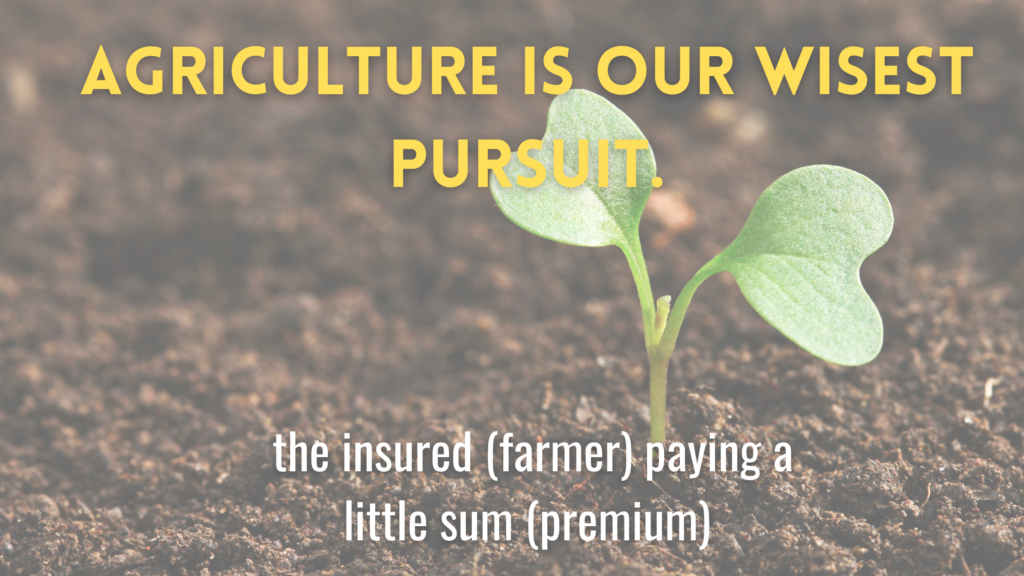One of the most difficult parts of starting an agricultural business is knowing what to do in the event that things go wrong. One thing you can do to limit your risk is to get agricultural insurance, which comes in many forms but provides you with financial support if one of your animals gets sick or if there’s a natural disaster like flood or drought. To learn more about agricultural insurance cover, continue reading this article.

- Property Damage
While your crop is growing and maturing, a variety of things can happen to cause it to be less valuable at harvest time. If you live in an area with fluctuating weather patterns, you could find yourself harvesting a crop that is much smaller than normal. Crops can also suffer from natural disasters such as droughts, floods or blights. To combat these risks, some farmers purchase property damage insurance.
- Livestock Losses
Crop insurance won’t cover losses related to your livestock. There are, however, insurance policies you can buy that will provide some coverage for your farm animals. If you have horses or other livestock that are part of your business, you may be able to purchase a policy through American National Lloyds (ANL).
Farm Animal Liability Insurance helps with losses sustained by third parties because of actions or behaviors by your livestock. For example, if one of your cows accidentally ran over a pedestrian and injured them, ANL would help offset medical costs and other expenses related to their recovery. A different policy— Farm Livestock Disease Coverage —provides coverage in case an epidemic sweep through your herd and causes loss.
- Equipment Breakdown
It’s easy to assume that a normal homeowner’s policy will cover losses to farm equipment. However, policies that are designed for non-agricultural use typically exclude any equipment that is used in farming, ranching, or timber operations. For example, a log splitter on a tree farm won’t be covered under most standard homeowner’s policies.
Fortunately, there are specialized policies for farmers and ranchers with coverage options for mechanical breakdown and livestock deaths. Depending on your operation and exposure to risk (whether it be from theft or environmental damage), you may need additional coverage if you live in an area prone to severe weather events like hail storms or flooding.
- Liability Concerns
One of your primary concerns as a farmer is liability. If one of your animals breaks out of its pen and causes property damage or injury to someone, you’re going to be held liable. An agricultural insurance policy will cover that liability. However, it’s not as simple as purchasing a policy that covers all your assets; you want to consider what kind of livestock you keep and how much coverage it requires.
- Crop Failure or Disease
Crop failure and disease are two of the biggest reasons for agricultural insurance claims. If you’re an organic farmer, you might think that crop failure is your only concern, but even traditional farmers can be hit with a nasty disease. You could lose all of your stock to chicken pox or foot-and-mouth disease.
Other times, people go out of business simply because they lack protection from natural disasters like floods or hurricanes. With so many possibilities out there, it pays to have a good insurance policy in place so that you’re covered when bad things happen.
- War or Terrorism
It’s one of those things that you hope never happens, but it probably will happen to someone. If it happens to you, your agricultural insurance policy will cover your losses in terms of repairs and replacement costs. What is covered varies by policy and company so make sure you read your contract carefully before signing on with an insurer.
You should know what perils are covered (floods, hurricanes, fires) and what aren’t (war or terrorism). Fortunately, war or terrorism isn’t common in most areas – but if it affects where you live then be sure to factor that into your risk assessment when determining how much insurance to buy.
- Hurricanes and Floods
If you live in a particularly hurricane-prone or flood-prone area, it’s important to choose an insurance policy that covers these events. Pay attention to any specific requirements set forth by your insurance company and make sure that they include storms or natural disasters commonly found in your area.
For example, if you’re located in Florida (where hurricanes are a real concern), make sure that your agricultural insurance includes hurricane coverage. This will help ensure you won’t have to replace everything should there be a major storm—and ensure that it doesn’t cost you thousands of dollars out of pocket.
- Natural Disasters
One of your main risks as an agricultural business owner is a natural disaster. Floods, hurricanes, tornadoes and other types of acts of God can bring down your buildings and leave you without a source of income. To protect yourself against such losses, you can purchase crop insurance that protects your crops from various weather-related disasters.
There are two basic types of crop insurance: revenue protection policies pay out after a natural disaster destroys your crops; actual production policies pay when Mother Nature doesn’t give you what she promised in her weather forecast.
- Agricultural Excess Rain
When it comes to agricultural insurance, there are a lot of different products that can be applied. The one I’m going to focus on today is excess rain. If you live in an area where rains could result in crop damage and you want coverage, then excess rain may be for you. This can also apply if your area suffers from drought which could lead to a loss of profits (if you don’t have water for your crops).